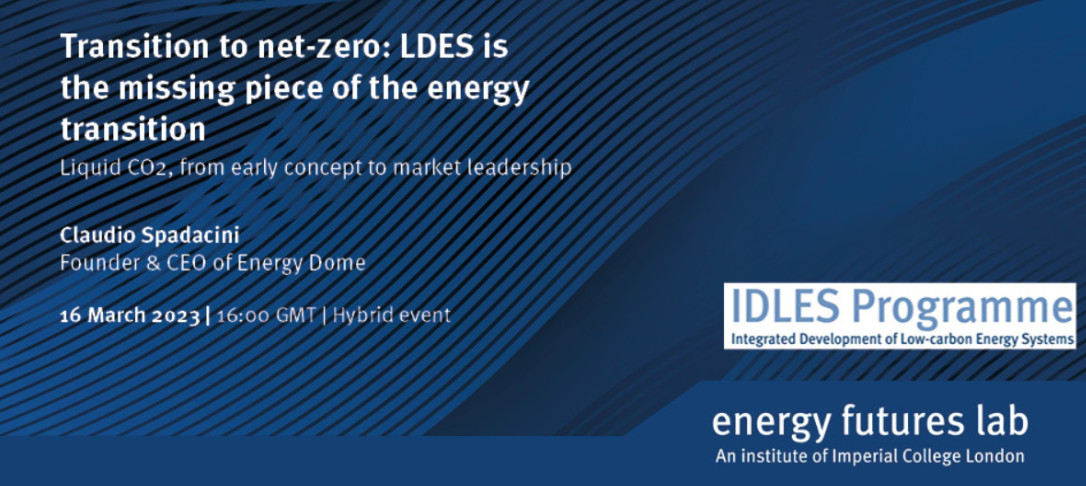
Booking has now closed – click here to watch the livestream
Transition to net-zero: LDES is the missing piece of the energy transition
Liquid CO2, from early concept to market leadership
This seminar will run from 16:00 – 17:00 with a Q&A session at the end. The seminar will be followed by a networking drinks reception from 17:00 – 18:00.
Dispatchable on-demand solar and wind power is essential to reach net-zero targets: Long-Duration Energy Storage (LDES) is the missing piece of the decarbonization puzzle. The carbon-free energy demand is growing as population is growing, as most relevant sectors (mobility, residential heating, etc) are converting to electric. A demand of LDES as big as 85-140 TWh by 2040 is expected (Source: LDES Council), which will generate a market potential of USD 1.5 to 4 trillion.
One or more affordable, efficient and sustainable energy storage technologies are urgently needed to enable the next generation energy market in order to allow a deeper penetration of renewables into the grid, but also to ensure the electric grid stability and resilience.
Long-Duration Energy Storage (LDES) includes all the technologies with a duration capacity between 6+ and 24 hours, which enable dispatchable green electricity through daily storage. Li-ion batteries are ideal for many applications but not for LDES due to high costs, limited lifespans, unavoidable degradation, exploitation of rare materials and limited recyclability. Other emerging energy storage technologies under development today, like Advanced Compressed Air Energy Storage (A-CAES), Liquid Air Energy Storage (LAES) and Flow Batteries lack in meeting the ambitious targets of affordability, efficiency and sustainability. On the contrary, Pumped Hydro Storage, which is the most consolidated solution for LDES and can be considered as a benchmark, has the only drawback of requiring peculiar geographic conditions to be developed and installed, need availability of a specific elevation difference, extensive use of land and long authorization / construction times.
In this scenario a viable option can be the Liquid CO2 LDES (CO2 Battery™ by Energy Dome) based on the close looping of CO2 between gaseous form at ambient pressure and high-pressure liquid status, where due to the liquid state, the pressure vessels can store liquid CO2 with high energy storage density.
The CO2 Battery™ can store energy for long periods of time, without any site dependency, and is capable of delivering all the typical services of utility-scale storage systems, including ancillary services and rotating inertia. The CO2 Battery™ has been conceived by implementing off-the-shelf components available from multiple Tier 1 suppliers from all over the world, making the deployment resilient to supply chain disruptions and allowing fast installation thanks to its design.
The present lecture provides an overview on the LDES market, the benchmark technologies, and the potential emerging technologies with a focus on the Liquid CO2 LDES.
Biography:
Claudio Spadacini holds a Master’s degree in Mechanical Engineering, with a focus on Turbomachinery, Energy Production and Conversion from the Polytechnic University of Milan. Claudio was awarded with the Sesini Award as a top graduate student and during his career filed 45 patents.
Claudio Spadacini is Founder and CEO of Energy Dome, a leading provider of long-duration energy storage solutions. The company developed a breakthrough technology, the CO2 Battery, to store large quantity of energy in a cost-effective and efficient way, with the mission to unlock renewable energy and make solar and wind power dispatchable 24/7.
An engineer by education, an entrepreneur by nature and experience, Claudio Spadacini has founded multiple successful energy ventures, having taken them from the early concept to market leadership. Prior to Energy Dome, Claudio founded and managed Exergy S.p.A. which has developed and installed more than 460 MWe of geothermal, waste heat recovery and CSP power plants under his guidance. These plants are based on the innovative technology of the radial outflow turbine, patented and developed by Claudio himself.
Claudio also founded Sebigas S.p.A., which designs, constructs and manages biogas plants worldwide with a portfolio of over 80 plants. Together with Andrea Dossi, Claudio is also the founder of Idroelettrica Cavaglio, a developer of hydroelectric power plants using drilled rock tunnels, with a record of having drilled the longest tunnel of its kind.
All of Claudio’s new ventures are based on disruptive technologies. Claudio is a skilled engineer with an extensive knowledge of conventional and renewable energy systems, turbomachinery and thermodynamic processes.
About IDLES
The Integrated Development of Low-Carbon Energy Systems (IDLES) programme brings together researchers from across Imperial College to provide the evidence needed to facilitate a cost-effective and secure transition to a low-carbon future.
This 5-year, EPSRC-funded programme started in November 2018 and centres on whole-energy systems analysis; aiming to create a modelling tool that can better coordinate the complex interactions within the energy domain and indicate optimal forms of future, integrated, energy systems to policy makers.
Using this approach to plan the UK’s future energy system has the potential to enable large cost savings in providing decarbonised energy, to ensure security of supply and compliance with emissions targets.
The IDLES programme will analyse across electricity, heat, gas and hydrogen networks, and across energy uses in transport, buildings, water networks, and industrial processes, simulating various scenarios and case-studies.
Energy consumption, exploitation of demand flexibility, stakeholder investment decisions, market design, incentivisation and policy objectives will all be considered in the programme’s analysis.
About Energy Futures Lab
Energy Futures Lab is one of seven Global Institutes at Imperial College London. The institute was established to address global energy challenges by identifying and leading new opportunities to serve industry, government and society at large through high quality research, evidence and advocacy for positive change. The institute aims to promote energy innovation and advance systemic solutions for a sustainable energy future by bringing together the science, engineering and policy expertise at Imperial and fostering collaboration with a wide variety of external partners.